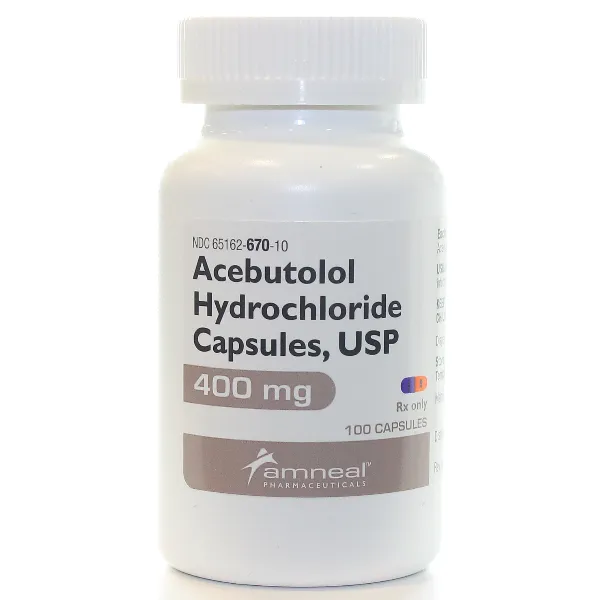Comprehensive Guide to Acebutolol: Uses, Dosage, Side Effects, and More
What is Acebutolol?
Overview of Acebutolol
Generic Name: Acebutolol
Brand Name: Sectral, generics
Drug Group: Beta-1 selective adrenergic receptor blocker; antiarrhythmic; antihypertensive
Commonly Used For
- Treat hypertension in adults, alone or in combination with other antihypertensives.
- Manage ventricular arrhythmias, including premature ventricular contractions (PVCs).
- Off-label uses include angina pectoris, anxiety-related tachycardia, or post-myocardial infarction management under specialist guidance.
Key Characteristics
Form: Oral capsules (200 mg, 400 mg); oral tablets in some markets.
Mechanism: Selectively blocks beta-1 receptors, reducing cardiac output and heart rate; ISA minimizes excessive heart rate reduction.

Approval: FDA-approved (1984 for Sectral) and EMA-approved for hypertension and arrhythmias.
Indications and Uses of Acebutolol
Acebutolol is indicated for:
Hypertension: Lowers blood pressure in adults to reduce the risk of cardiovascular events like stroke or heart attack.
Ventricular Arrhythmias: Controls irregular heart rhythms, such as PVCs, to stabilize cardiac function.
Off-Label Uses: May be used for stable angina, performance anxiety (e.g., tachycardia), or secondary prevention post-myocardial infarction under specialist supervision.
Dosage of Acebutolol
Dosage for Adults
Hypertension:
- Initial: 400 mg orally once daily or 200 mg twice daily.
- Maintenance: 400–800 mg/day, adjusted based on blood pressure response.
- Maximum: 1,200 mg/day (rarely used).
Ventricular Arrhythmias:
- Initial: 200 mg orally twice daily.
- Maintenance: 600–1,200 mg/day, divided into two doses.
Off-Label (e.g., Angina): 200–600 mg/day, titrated by a specialist.
Dosage for Children
Not approved for pediatric use; limited data exist for off-label use in adolescents under specialist oversight.
Dosage for Pregnant Women
Pregnancy Category B: Limited human data; use only if benefits outweigh risks, as beta-blockers may cause fetal bradycardia. Consult a cardiologist.
Dosage Adjustments
Renal Impairment:
- CrCl 25–49 mL/min: Reduce dose by 50%.
- CrCl <25 mL/min: Reduce dose by 75% or avoid.
Hepatic Impairment: No specific adjustments; monitor for prolonged effects.
Elderly: Start with lower doses (e.g., 200 mg/day) due to reduced renal function.
Additional Considerations
- Take with or without food; food may delay absorption but does not affect efficacy.
- Monitor blood pressure and heart rate regularly during dose titration.
How to Use Acebutolol
Administration: Take the medication orally as capsules or tablets, with or without food. Swallow whole with water.
Timing: Administer once or twice daily as prescribed; consistency aids blood pressure and rhythm control.
Missed Dose: Take as soon as remembered unless it’s nearly time for the next dose; do not double doses. Consult your doctor if multiple doses are missed.
Additional Tips:
- Do not abruptly stop the drug, as this may cause rebound hypertension or arrhythmias; taper under medical supervision.
- Report symptoms like dizziness, fatigue, or slow heart rate immediately.
Contraindications for Acebutolol
Patients with hypersensitivity to Acebutolol or other beta-blockers.
Those with severe bradycardia, second- or third-degree heart block, or sick sinus syndrome (unless a pacemaker is in place).
Patients with cardiogenic shock or decompensated heart failure.
Those with severe chronic obstructive pulmonary disease (COPD) or asthma (relative contraindication due to beta-1 selectivity).
Warnings & Precautions for Acebutolol
General Warnings
Bradycardia and Hypotension: Risk of slow heart rate or low blood pressure; monitor heart rate and blood pressure regularly.
Heart Failure: May worsen heart failure in decompensated patients; use cautiously with close monitoring.
Bronchospasm: Though beta-1 selective, the medication may cause bronchospasm in susceptible patients; avoid in severe asthma.
Abrupt Discontinuation: Stopping the treatment suddenly may lead to rebound hypertension, angina, or arrhythmias; taper gradually.
Diabetes: May mask hypoglycemia symptoms (e.g., tachycardia); monitor blood glucose closely.
Use in Specific Populations
Pregnancy: Category B; use cautiously, as beta-blockers may cause fetal growth restriction or bradycardia.
Breastfeeding: Excreted in breast milk; avoid breastfeeding or monitor infant for bradycardia.
Elderly: Increased risk of bradycardia and hypotension; start with lower doses.
Children: Not approved; safety data are limited.
Renal Impairment: Adjust doses to prevent accumulation of active metabolites.
Additional Precautions
- Inform your doctor about heart, lung, or diabetes conditions before starting the treatment.
- Avoid activities requiring alertness (e.g., driving) if experiencing dizziness or fatigue.
Overdose and Management of Acebutolol
Overdose Symptoms
- Severe bradycardia or heart block.
- Hypotension or shock.
- Bronchospasm or respiratory distress.
- Fatigue, confusion, or seizures.
Immediate Actions
Contact Healthcare Provider: Seek medical advice immediately.
Supportive Care: Administer atropine for bradycardia, fluids for hypotension, or bronchodilators for bronchospasm.
Monitor: Check ECG, blood pressure, and respiratory status.
Additional Notes
- Overdose risk is low with proper dosing; store securely to prevent misuse.
- Report persistent symptoms promptly.
Side Effects of Acebutolol
Common Side Effects
- Fatigue (10–20%)
- Dizziness (6–14%)
- Headache (4–10%)
- Nausea (2–4%)
- Bradycardia (2–5%)
These effects are often mild and may resolve with continued use.
Serious Side Effects
Seek immediate medical attention for:
Cardiac: Severe bradycardia, heart block, or worsening heart failure.
Respiratory: Bronchospasm or shortness of breath.
Allergic Reactions: Rare; rash, hives, or anaphylaxis.
Neurologic: Confusion, depression, or hallucinations (rare).
Additional Notes
- Regular monitoring of heart rate and blood pressure is essential.
- Report any new or worsening symptoms, especially breathing difficulties.
Drug Interactions with Acebutolol
The medication may interact with:
Other Antihypertensives (e.g., Amlodipine, Clonidine): Enhance hypotensive effects; monitor blood pressure closely.
Antiarrhythmics (e.g., Amiodarone): Increase risk of bradycardia or heart block; use with caution.
NSAIDs (e.g., Ibuprofen): Reduce antihypertensive effect; monitor blood pressure.
Sympathomimetics (e.g., Albuterol): May counteract beta-blockade; adjust doses as needed.
Insulin or Oral Hypoglycemics: Mask hypoglycemia symptoms; monitor glucose levels.
Action: Provide your healthcare provider with a complete list of medications and supplements.
Patient Education or Lifestyle
Medication Adherence: Take Acebutolol consistently as prescribed to maintain blood pressure and rhythm control. Refill prescriptions early to avoid interruptions.
Monitoring: Check blood pressure and pulse regularly at home; report readings below 50 bpm or above 100 bpm.
Lifestyle: Follow a heart-healthy diet (low sodium, low fat), exercise moderately, and avoid smoking to enhance treatment efficacy.
Avoid Abrupt Stopping: Taper the drug gradually under medical supervision to prevent rebound effects.
Diabetes Management: Monitor blood sugar closely, as the medication may mask low blood sugar symptoms.
Emergency Awareness: Carry information about your condition (e.g., hypertension) and medications for emergencies.
Pharmacokinetics of Acebutolol
Absorption: Well-absorbed orally (~40–60%); peak plasma concentration at 2–4 hours.
Distribution: Volume of distribution ~3 L/kg; moderate protein binding (26%).
Metabolism: Hepatic, via cytochrome P450; active metabolite (diacetolol) has similar beta-blocking activity.
Excretion: Renal (30–40% as diacetolol); fecal (50–60%); reduced in renal impairment.
Half-Life: Acebutolol: 3–4 hours; diacetolol: 8–12 hours.
Pharmacodynamics of Acebutolol
The drug exerts its effects by:
- Selectively blocking beta-1 adrenergic receptors, reducing heart rate and cardiac output.
- Lowering blood pressure by decreasing peripheral vascular resistance.
- Stabilizing ventricular arrhythmias by reducing myocardial excitability.
- Providing ISA, which maintains baseline cardiac stimulation, reducing severe bradycardia risk.
Storage of Acebutolol
Temperature: Store at room temperature (20–25°C or 68–77°F); avoid moisture and heat.
Protection: Keep in original container to protect from light.
Safety: Store out of reach of children to prevent accidental ingestion.
Disposal: Follow local regulations or consult a pharmacist for safe disposal of unused or expired medication.
Frequently Asked Questions (FAQs)
Q: What does Acebutolol treat?
A: The drug treats hypertension and ventricular arrhythmias.
Q: Can Acebutolol be stopped suddenly?
A: No, abrupt discontinuation may cause rebound hypertension or arrhythmias; taper under medical supervision.
Q: Is Acebutolol safe for asthma patients?
A: Use cautiously in mild asthma due to beta-1 selectivity; avoid in severe asthma or COPD.
Q: How long does Acebutolol take to work?
A: Blood pressure reduction may occur within hours, with full effects in 1–2 weeks.
Q: Can Acebutolol cause fatigue?
A: Yes, fatigue is a common side effect; report persistent symptoms to your doctor.
Regulatory Information
The medication is approved by:
U.S. Food and Drug Administration (FDA): Approved in 1984 (Sectral) for hypertension and ventricular arrhythmias.
European Medicines Agency (EMA): Approved for similar indications.
Other Agencies: Approved globally for equivalent uses; consult local guidelines.
References
- U.S. Food and Drug Administration (FDA). (2023). Sectral (Acebutolol) Prescribing Information.
- Official FDA documentation detailing the drug’s approved uses, dosage, and safety.
- European Medicines Agency (EMA). (2023). Acebutolol Summary of Product Characteristics.
- EMA’s comprehensive information on the medication’s indications and precautions in Europe.
- National Institutes of Health (NIH). (2023). Acebutolol: MedlinePlus Drug Information.
- NIH resource providing detailed information on the drug’s uses, side effects, and precautions.
- World Health Organization (WHO). (2023). WHO Model List of Essential Medicines: Acebutolol.
- WHO’s inclusion of Acebutolol as an essential medicine for hypertension.
- Journal of the American College of Cardiology. (2020). Beta-Blockers in Hypertension and Arrhythmias.
- Peer-reviewed article on the efficacy of beta-blockers like Acebutolol (note: access may require a subscription).
